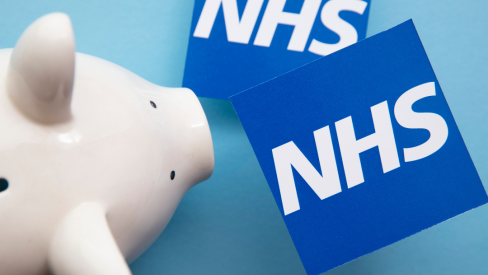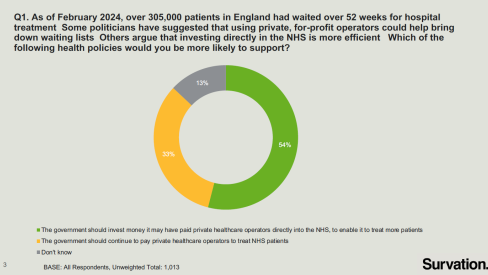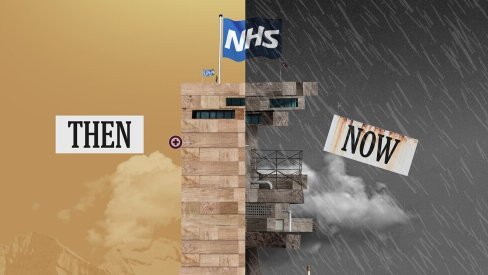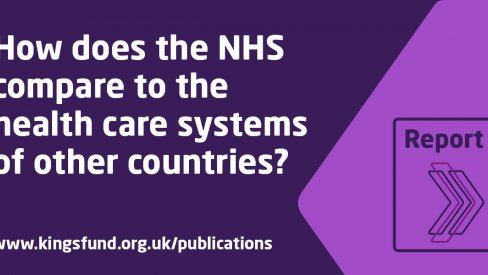
30 August 2023
The Labour Party created the NHS in 1948 to work for patients, not profit.
The last 13 years of successive Conservative governments have seen a systematic expansion of outsourcing in the NHS. It is no surprise that the public wants our NHS reinstated as a fully public service. 78% of us want a fully publicly run NHS.
We are calling on Keir Starmer to commit to reinstating our NHS as a fully public service. Please sign and share the petition here.
Here are a few questions you may have about why outsourcing is bad for our NHS, for staff and for patients and our answers to them.
1. Reinstating the NHS as a fully public service entails reinstating the Secretary of State for Health’s duty to provide care to everyone. How does restoring this duty help or change anything?
The NHS Act 1946 said this about the Secretary of State’s duty to the public:
“It shall be the duty of the Minister of Health […] to promote the establishment in England and Wales of a comprehensive health service […] and for that purpose to provide or secure the effective provision of services in accordance with the following provisions of this Act”
This duty, in the words of the Act, meant they must provide “(a) hospital accommodation; (b) medical, nursing and other services required at or for the purposes of hospitals; (c) the services of specialists, whether at a hospital, a health centre […] or a clinic or, if necessary on medical grounds, at the home of the patient…”.
Despite being slightly amended in 2006, the duty remained and was interpreted as requiring the secretary of state to make sure the NHS has enough doctors, nurses, hospitals, clinics, beds, equipment, etc. It also meant that the public could hold the government accountable, including by suing them, if this duty was not performed.
This duty was repealed by the hugely controversial Health and Social Care Act 2012 and replaced by a duty to “arrange” these health services, which no longer belongs to the Secretary of State but to local/regional health authorities (CCGs at the time, but ICBs today). Legal analysts suggest that this change “weakens the health secretary’s overarching duty because primary legislation no longer specifies the measures he or she must take to promote a comprehensive health service.”
These legal changes have unsurprisingly coincided with, if not clearly resulted in, cuts, privatisation and underfunding of the NHS and we demand the reinstatement of this duty.
2. Why should we rule out outsourcing?
This approach to the question of the role of private healthcare companies in the NHS doesn’t capture the essence of why the NHS as a fully public service is fundamentally superior. Our NHS wins if the health of our nation is good. Private health companies, whose profits depend on lots of people needing healthcare, lose if the health of our nation is good. This simple difference in the metrics for success of our NHS compared to private companies shows why we must not allow private profit considerations further into our NHS.
Moreover, the available evidence is clear. Private companies tend to provide a lower quality service, are parasitic on the NHS, are more expensive overall (an example in cleaning services) and lead to deaths because the profit motive makes them cut corners and costs.
3. Why do you say the NHS needs more funding?
According to an analysis by the British Medical Association, if NHS funding had kept pace with a yearly increase of 4.1%, which was typical before 2009/10, the NHS would receive £60 billion more in 2020/21 than it received. An NHS Confederation analysis found that NHS funding has been cut by between £4 and £9 billion in real (inflation-adjusted) terms in 2022.
Compared to other countries in the EU, the NHS is significantly underfunded. An analysis by Health Foundation in 2022 found that in order for NHS funding to catch up with healthcare funding per head in France or Germany, the UK government would need to spend “an additional £40bn and £73bn (21% to 39% increase respectively) of total health spending each year in the UK”.
4. GPs have always been private, and the NHS has always purchased goods and some services from the private sector, so isn’t it ignorant to demand an end to NHS outsourcing?
It is important to note that although GPs have always been independent businesses from the start, it is not the same thing as saying that they are private companies in the normal sense for a number of reasons.
The pay for GPs has always been determined by the NHS, designed by the Doctors and Dentists Review Body to be largely in line with the pay of hospital consultants who are directly employed by the NHS. They are part of the NHS pension scheme. And the incomes of most GP surgeries come almost entirely from contracts with the NHS. The NHS is their main, and often only, client.
But this distinction between the traditional GP model and normal private companies was also laid down in the law until 2004. You can read analysis by former GP Dr Louise Irvine for our website here.
To summarise, prior to 2004, GPs did not need to have a contract with the NHS to work for the NHS. They simply needed to join the medical list and sign up to adhere to NHS GP regulations. The new GP contracts introduced in 2004 made a distinction between the normal model and normal private companies, some of whom were then allowed to run GP surgeries for the first time. GMS (General Medical Services), PMS (Primary Medical Services) and APMS (Alternative Provider Medical Services) contracts were introduced, but only bodies run by medical professionals could hold the first two kinds of contracts whereas private US multinationals like Centene could hold APMS contracts. This shows that GPs have never been seen as a normal private company.
Also, there is a difference between the NHS buying goods from the private sector and the NHS contracting private companies to provide a service (from hospital cleaning to orthopaedic surgeries) to NHS patients. The NHS needs reams of paper to carry out the administrative aspects of its work and we don’t expect the NHS to make its own paper. They can buy paper from the private sector. Same as the vast majority of the medication that the NHS prescribes to patients. The NHS buys medication from the private sector, with NICE (the National Institute for Clinical Excellence) deciding what medications are value for the NHS’s money and setting the price the NHS will pay for them.
But this is different from contracting private companies to provide services. The evidence is that private companies tend to provide a lower quality service, are parasitic on the NHS, are more expensive overall (an example in cleaning services) and lead to deaths because the profit motive makes them cut corners and costs.
The situation in dentistry and pharmacies is very similar to that in GP services, with historic underfunding and more private involvement leading to more closures and the prioritisation of profits over people. A review of all of these areas is long overdue, but it is outside the scope of this petition.
5. Isn’t the real problem with the NHS that we are spending too much money paying managers instead of hiring more nurses?
The idea that the NHS has too many managers is a popular talking point from some in the media. A Telegraph commentator recently decried “the monstrous, metastasising bureaucracy that sucks resources away from the life-giving parts of the NHS”. But, for a point so regularly made, there is no evidence of it. To quote from a 2022 analysis by NHS Confederation, ‘[A]t approximately 2 per cent, managers are a very small proportion of the NHS workforce. By comparison, ‘managers, directors and senior officials’ in the UK as a whole make up 9.5 percent of the workforce. As Stephen Black has argued, even medical charities employ more managers than the NHS. In reality, he suggests, the NHS is possibly “one of the most undermanaged organisations on the planet.”’
Furthermore, the idea that NHS managers waste NHS resources is equally baseless. The NHS is an unusually efficient healthcare system compared to the healthcare systems of other developed economies. This means we achieve very good results from spending just a fraction of what other countries spend for similar or even worse results. A 2012 Commonwealth Fund study comparing the NHS to the healthcare systems of Australia, France, Germany, Netherlands, Sweden, Norway, Switzerland and the US, ranked the NHS as number one in terms of efficiency.
It is obviously possible that there are managers in the NHS that are not needed or areas where NHS money could be spent more efficiently, but there is little to no evidence that either of these is significant enough to be the big issue facing the NHS. In terms of management, NHS money is currently close to being as well spent as it can be. The only problem is that there is just not enough of it to deliver the NHS we need, to cut waiting lists and build an NHS fit for the future.
6. Are you saying we should stop people from going private?
There are two questions here. One is about whether people who have money and want to go privately should be allowed to do so, and the other is about sending NHS patients to the private sector, paid for by the NHS, as a way to cut NHS waiting lists.
On the first question, we don’t believe it should be illegal for people to pay for their care in the private sector is they want to. It should be clear what this means. 270,000 people paid for care in the private sector last year, and so many of those people would rather have not done so and gotten care from the NHS. So many of them had to take out loans, dig into their savings or begging for help online to do so.
As a direct result of decades of underfunding and privatisation, our NHS is dealing with huge waiting lists. No one should ever feel forced to pay for their own care. Our NHS should be there for everyone when they need it. Let’s fund it properly and get rid of private profit-taking interests in it.
On the second question though, the private sector has clearly not helped us cut waiting lists. It is a waste of public money to continue to think they are a way out of the waiting lists crisis. Based on responses to Open Democracy’s Freedom of Information requests, despite the government spending at least £500 million on private hospital contracts to “ease the backlogs” in 2022, 6.6% fewer people were treated that year than in 2019.
Furthermore, a report released by parliament’s Public Accounts Committee in March 2023 shows that when the committee asked NHS England for evidence that the government’s elective recovery plan is successfully bringing down waiting lists, NHS England admitted they “did not have strong evidence for some of its programmes at present”.
This lack of evidence for the efficacy of using private hospitals to deal with waiting lists extends to Scotland, Wales and Northern Ireland as well, all of whom have aimed to depend on the private sector to deal with waiting lists. In NI, for example, despite announcing plans in May 2022 to use “independent sector providers to assess and treat patients who are on waiting lists”, almost one year on NI still has the worst waiting list crisis in the UK.
It is fairly straightforward why this is the case: private hospitals stand to benefit a great deal more from huge NHS waiting lists than they can benefit from helping lower them. A leaked dossier obtained by The Independent revealed that private hospitals signed a contract worth £2 billion with NHS England to help with waiting lists in April 2020. NHS leaders noticed that those private hospitals preferred privately paying patients to NHS patients.
For private hospitals, the waiting lists are a gift that keeps on giving, as it forces hundreds of thousands of people across every nation of the UK to go private and pay out of pocket for their care. Their profits have soared as a result of this crisis.
There are other reasons why it made no sense to depend on private hospitals to help with waiting lists. They do not train doctors, and they do not have their own doctors. They use NHS doctors, which means there is a hard capacity ceiling on how much they can do overall. Even worse, with private hospitals focusing on privately paid work, their recruitment drives to lure NHS doctors, trained at significant public expense, into the private sector means even fewer people on NHS waiting lists can be seen.
7. Aren’t you being ideological when we need all the solutions we can get?
Giving a choice to people on waiting lists to use the private sector free of charge has already been government policy since at least 2017/18. This policy has been expanded as part of the elective recovery plan launched in February 2022. As expected, it is not making a dent in NHS waiting lists. As we’ve explained above, even if we used all the capacity available in the private sector, we wouldn’t be able to cut the waiting lists significantly since private hospitals don’t have their own doctors; they depend on NHS doctors to work for them.
We say “Only the NHS” because only the NHS can get us out of this crisis.
- Private hospitals do not train doctors. Only the NHS does.
- Private hospitals do not have A&E departments. Only the NHS does.
- Private hospitals do not care for all patients - they cherry-pick. Only the NHS cares for all.
We say “Only the NHS” because politicians have a choice between spending our limited public resources building up our NHS or building up the profits of private companies - and they must choose Only our NHS.
8. What would you do about PFI? It’s all very well bringing contracts in-house but these deals are costing the NHS huge amounts of money
NHS Trusts continue to pay for historic debts accrued because of Private Finance Initiatives (PFI). PFI was a policy of contracting private companies to build NHS hospitals at their own expense, with the NHS paying those companies back at rates much higher than they spent building the hospitals (plus interest) in yearly instalments. NHS Trusts paid out almost half a billion pounds in PFI debts in 2021 and are said to still owe around £50 billion in total. There are significant limitations on the public’s ability to do anything about these contracts, but academics have suggested a few options including potentially ending up to 15% of the contracts outright due to underperformance. What is most important, is that politicians treat the failure of PFIs as an object lesson in why privatisation is bad for the public purse.
9. What about social care?
As we’ve already shown, the real problem with the NHS is the lack of adequate funding. However, it must be said that we need a National Care Service, which is free at the point of need, funded on the same model as the NHS. A national care service would remove some of the pressure on the NHS resulting from many patients who are too fit to be in the hospital but without social care spots available to be sent into ending up being stuck in the hospital as a result.















Comments
Timothy Gray replied on Permalink
No only should the NHS be returned in full to public ownership, but also laws should be introduced to make sure that it can never be put into privatisation in all or any small part.
Timothy Gray replied on Permalink
Not only should the NHS be returned in full to public ownership, but laws should also be introduced to make sure that it can never be put into privatisation in all or any small part.
Add new comment